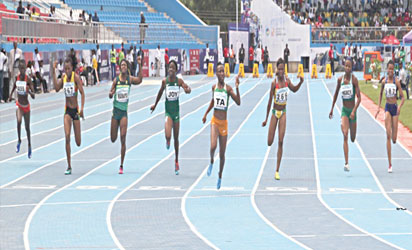By Yemi Olus
It’s not the best of times for Nigerian Athletics! One of the country’s most talented athletes and No.1 in the women’s 400m Hurdles for the past two years, Glory Nathaniel,was a few weeks ago, provisionally suspended by the Athletics Integrity Unit(AIU) due to the presence of a prohibited substance, Stanozolol, in her system.
National Police Games: Enugu Police Command re-screens 112 athletes

A Provisional Suspension is when an athlete is suspended temporarily from participating in any competition or activity in Athletics prior to a final decision at a hearing conducted under the International Association of Athletics Federations (IAAF) Anti-Doping Rules or the Integrity Code of Conduct.The AIU was founded by the IAAF last year to combat doping in the sport,and the unit functions fully independently from the IAAF.
2018 Youth Olympic Games: Chukwuma, Akintola win medals for Nigeria
Nathaniel won Gold for Nigeria at the 2018 African Championships in Asaba, finishing ahead of Morocco’s Lamiae Lhabze and defending champion, South Africa’s Wenda Nel. The details surrounding her positive test are not yet clear, as the date of control was not revealed by the AIU. However, if it happened before or during the African Championships, there is a huge possibility of being stripped of the Gold medal.
What makes this development heartbreaking is the fact that Nathaniel’s talent is not in doubt. She’s been consistent in the last three years and had been positioned as the one to break Ajoke Odumosu’s National Record of 54.40secs set at the London 2012 Olympics.
Nathaniel represented Nigeria at the World Championships in London last year where she made her debut at the championships with her brother Samson, becoming the second set of siblings after Osmond and Davidson Ezinwa, to represent Nigeria at the IAAF World Championships. She got to the semis in the 400m Hurdles, and was part of the women’s 4x400m relay team that finished 5th in the final.
At the 2018 Commonwealth Games in Gold Coast, Nathaniel set a new Personal Best of 55.01secs in the semis and finished 6th in the final. She went on to win a Silver medal in the 4x400m.It is therefore sad that such a promising athlete would have to spend some time away from the track due to a doping infringement.
The last time Nigeria was hit with a doping scandal at this level was in 2016 when another talented female quartermiler, Tosin Adeoloye was banned for eight years in 2016 after a failed drugs test. She had previously tested positive to an anabolic steroid at the 2012 National Sports Festival in Lagos, and was subsequently banned for two years. She returned to the sport in 2015 only to fail another test in 2016.
The pair of Samson Idiata and Chinazom Amadi who won Gold in the men and women’s Long Jump events respectively at the 2015 African Games in Congo Brazzaville, were stripped of their medals after being banned for four years each for failing dope tests in Brazzaville. Sprinter Deborah Odeyemi suffered the same fate as well at the Games. The bans ended the careers of all four athletes.
Unlike in the past where an athlete was solely held responsible for failed dope tests, the IAAF is now coming up with new anti-doping measures that would hold National Federations more accountable for their athletes. This became necessary following the widespread doping scandal that enmeshed Russia’s Athletics, which led to the European nation being banned from the Rio 2016 Olympics.
Part of the measures being put in place will see the AIU Board categorizing member federations into one of three groups based on their level of success and the perceived risk that the federation poses to the sport from possible doping.In descending order, the categories will be A, B and C.
Category A will be the smallest category including the previous “watch list” Federations. It would comprise of members most at risk of doping.Athletes from these countries will have to undergo at least three out-of-competition doping tests in the 10 months prior to a World Championships or Olympics.Four member federations: Kenya, Ethiopia, Belarus and Ukraine, currently fall within that group.
Category B will be the Federations who have international-level success in Athletics, and Category C will be the largest group containing smaller federations with limited international success in Athletics.The rules are to come into effect in 2019.
AIU chairman, David Howman, said: “For too long the strict requirements of the anti-doping rules have fallen largely onto athletes. The IAAF Council should be congratulated for adopting innovative new rules that also make all of its member federations accountable on anti-doping matters. This will help ensure lasting and meaningful change in Athletics.”
Going forward, the Athletics Federation of Nigeria (AFN) must demonstrate that they have zero tolerance for doping, and take proactive steps in ensuring that our athletes compete fairly at all times. They must also do more in terms of sensitizing the athletes about the threat doping poses to their careers. If the new rules being proposed are anything to go by, it means that the action of an individual can pose a great risk to the nation as a whole, and that is why the AFN must be up and doing.
And to the athletes, I would re-echo the AIU’s warning: “As an athlete you are solely responsible for whatever is in your body at all times.Our advice is simple:IF IN DOUBT, DON’T TAKE IT.”
Source: https://www.vanguardngr.com/2018/10/developing-zero-tolerance-for-doping-in-nigerian-athletics/


